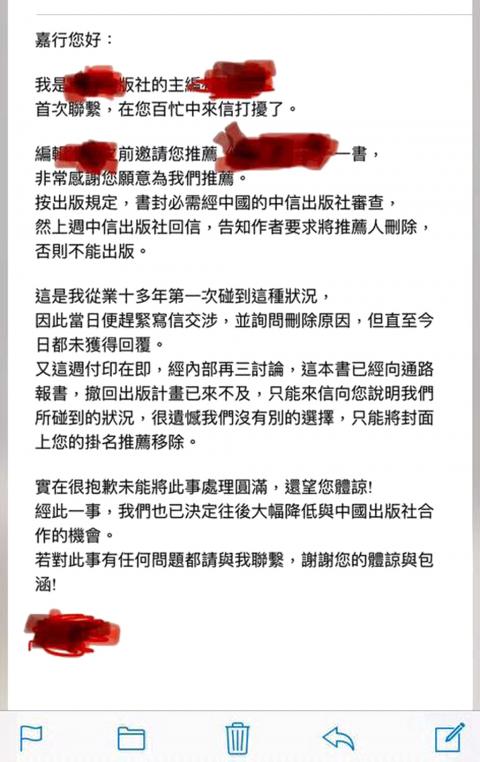Democratic Progressive Party (DPP) lawmakers yesterday condemned Chinese censorship after entertainer Chen Chia-hsing (陳嘉行) said his recommendation for a new book was removed due to pressure from a Chinese publisher.
Chen yesterday posted on Facebook an image of a letter he received from the editor-in-chief of the unidentified book’s Taiwanese publisher.
In the letter, the editor-in-chief, whose name was blacked out in the online image, began by thanking Chen for agreeing to write a recommendation for the new book.

Photo: Screengrab from Facebook
According to publishing regulations, the book cover must be reviewed by China’s CITIC Press Group, the letter said.
Last week, the Chinese publishing company informed the book’s author that Chen’s recommendation must be removed if the book is to be published, it said.
The editor-in-chief said that having worked in the industry for more than 10 years, it was the first time they ever encountered something like this.
The editor-in-chief asked the Chinese publisher for a reason, but has yet to receive a response, the letter said.
Since it is too late to withdraw plans to publish the book, the company had no choice but to remove Chen’s recommendation from the cover, it said, expressing the company’s regret.
In a brief statement posted alongside the image, Chen apologized for causing the Taiwanese publisher trouble and said he is aware of Chinese censorship, especially toward Taiwanese.
“Politics is politics, publishing is publishing,” he wrote.
Chen might have run afoul of Chinese censors because he had previously publicly expressed his support for President Tsai Ing-wen (蔡英文).
In his statement, Chen also called on the Chinese Nationalist Party (KMT) to “take a look at Tibet” as it proposes signing a peace treaty with China.
The incident highlights the difference in freedom of speech in Taiwan and China, DPP Legislator Liu Shyh-fang (劉世芳) said.
In Taiwan, excluding cases that contravene defamation laws or other laws, any views that are critical of politicians, such as Tsai or Kaohsiung Mayor Han Kuo-yu (韓國瑜), are protected by freedom of speech, she said.
In contrast, Chinese censorship is not limited to publishing, but also extends to television shows, she said, citing as an example reports that a male entertainer’s ears were blurred out because he was wearing earrings.
DPP Legislator Chuang Ruei-hsiung (莊瑞雄) called the slogans that politicians use to describe Taiwan-China relations, such as “the two sides of the Taiwan Strait are one family,” ironic in light of the incident.
The incident shows that China maintains strict control on published content, DPP Legislator Rosalia Wu (吳思瑤) said.
China has repeatedly attempted to weaken or eliminate Taiwan’s “most precious” values, including freedom of thought, democratic speech and human rights, she said.
Although what happened in Chen’s case is new, similar situations could continue to occur, she added.

The US government has signed defense cooperation agreements with Japan and the Philippines to boost the deterrence capabilities of countries in the first island chain, a report by the National Security Bureau (NSB) showed. The main countries on the first island chain include the two nations and Taiwan. The bureau is to present the report at a meeting of the legislature’s Foreign Affairs and National Defense Committee tomorrow. The US military has deployed Typhon missile systems to Japan’s Yamaguchi Prefecture and Zambales province in the Philippines during their joint military exercises. It has also installed NMESIS anti-ship systems in Japan’s Okinawa

‘WIN-WIN’: The Philippines, and central and eastern European countries are important potential drone cooperation partners, Minister of Foreign Affairs Lin Chia-lung said Minister of Foreign Affairs Lin Chia-lung (林佳龍) in an interview published yesterday confirmed that there are joint ventures between Taiwan and Poland in the drone industry. Lin made the remark in an exclusive interview with the Chinese-language Liberty Times (the Taipei Times’ sister paper). The government-backed Taiwan Excellence Drone International Business Opportunities Alliance and the Polish Chamber of Unmanned Systems on Wednesday last week signed a memorandum of understanding in Poland to develop a “non-China” supply chain for drones and work together on key technologies. Asked if Taiwan prioritized Poland among central and eastern European countries in drone collaboration, Lin

NO CONFIDENCE MOTION? The premier said that being toppled by the legislature for defending the Constitution would be a democratic badge of honor for him Premier Cho Jung-tai (卓榮泰) yesterday announced that the Cabinet would not countersign the amendments to the local revenue-sharing law passed by the Legislative Yuan last month. Cho said the decision not to countersign the amendments to the Act Governing the Allocation of Government Revenues and Expenditures (財政收支劃分法) was made in accordance with the Constitution. “The decision aims to safeguard our Constitution,” he said. The Constitution stipulates the president shall, in accordance with law, promulgate laws and issue mandates with the countersignature of the head of the Executive Yuan, or with the countersignatures of both the head of the Executive Yuan and ministers or

CABINET APPROVAL: People seeking assisted reproduction must be assessed to determine whether they would be adequate parents, the planned changes say Proposed amendments to the Assisted Reproduction Act (人工生殖法) advanced yesterday by the Executive Yuan would grant married lesbian couples and single women access to legal assisted reproductive services. The proposed revisions are “based on the fundamental principle of respecting women’s reproductive autonomy,” Cabinet spokesperson Michelle Lee (李慧芝) quoted Vice Premier Cheng Li-chiun (鄭麗君), who presided over a Cabinet meeting earlier yesterday, as saying at the briefing. The draft amendment would be submitted to the legislature for review. The Ministry of Health and Welfare, which proposed the amendments, said that experts on children’s rights, gender equality, law and medicine attended cross-disciplinary meetings, adding that